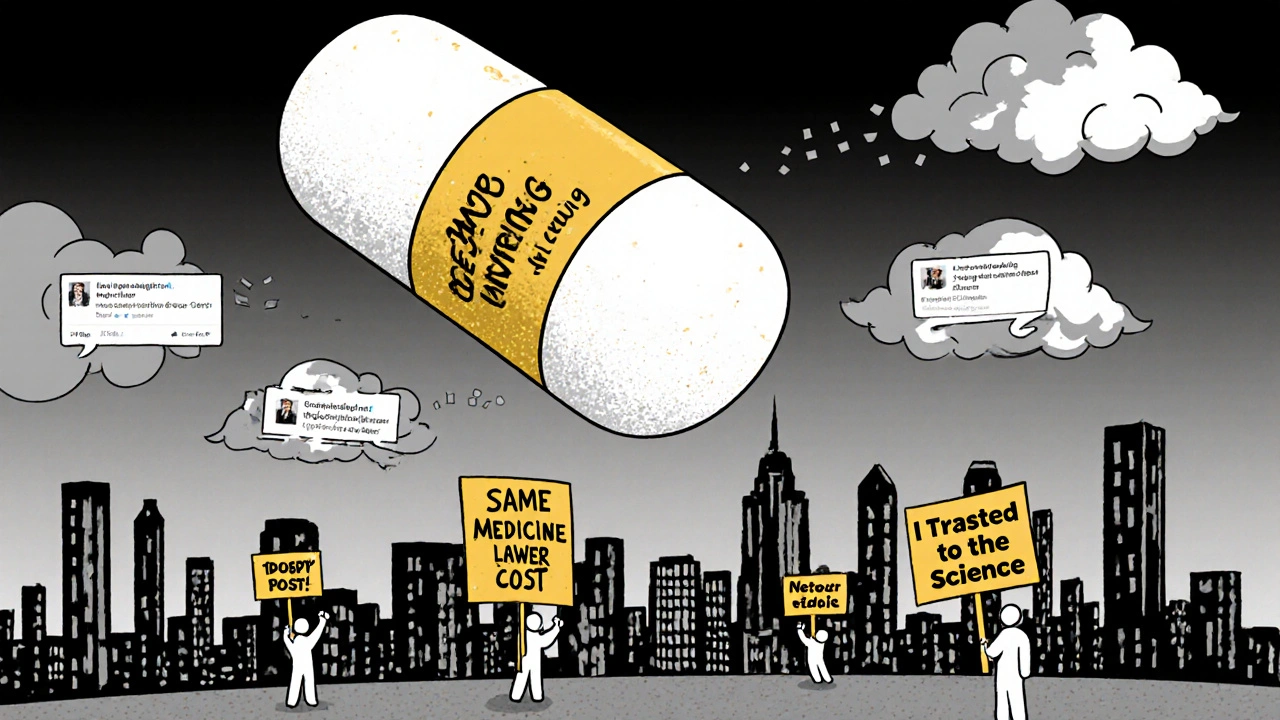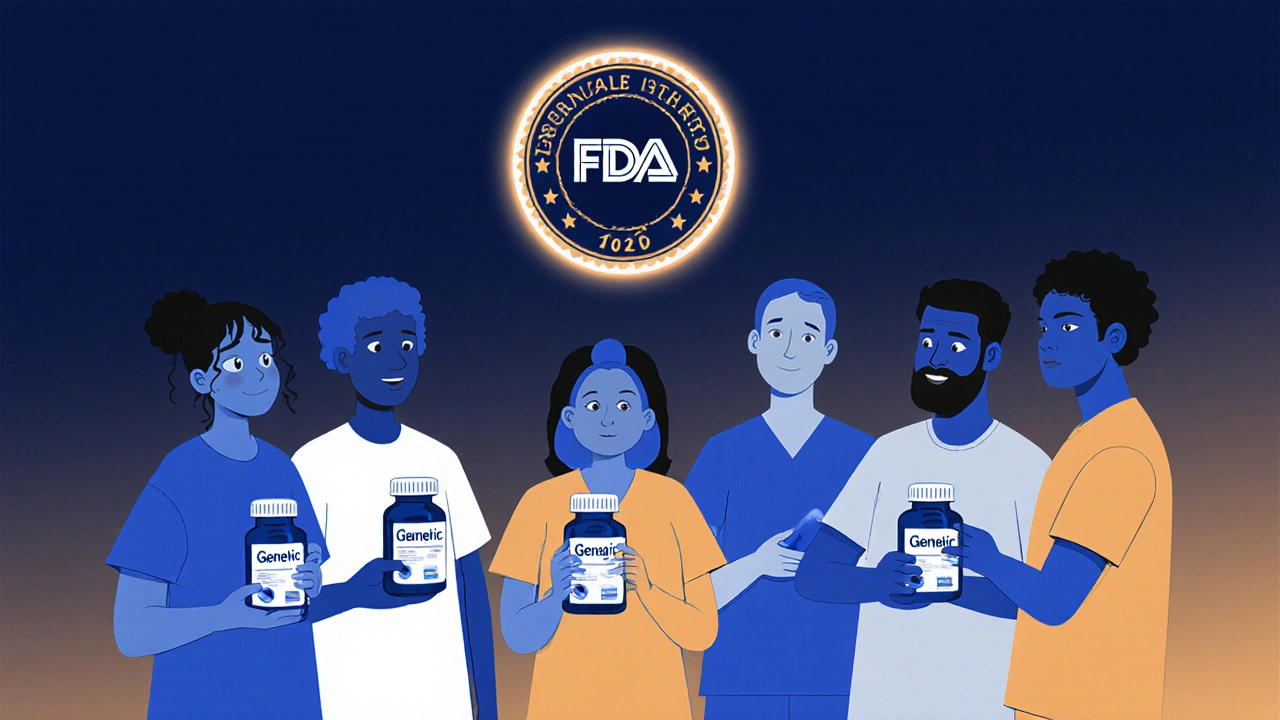When you pick up a prescription, you might not think twice about whether it’s the brand-name pill or the generic version. But for millions of people, that choice carries emotional weight-especially when they read online reviews from others who say the generic didn’t work the same way. It’s not about science. It’s about trust.
Why People Doubt Generics, Even When Science Says They’re the Same
Generic medications are legally required to contain the exact same active ingredient as their brand-name counterparts. The FDA demands they meet strict bioequivalence standards: their absorption rate in the body must fall within 80-125% of the brand drug’s. In lab tests, they’re identical. Yet, nearly 36% of patients still believe generics are less effective. Why? It’s not because the pills are different. It’s because people feel different taking them. A 2018 study found patients given identical tramadol pills-same dosage, same manufacturer, same packaging-were more likely to stop taking them and report more pain if the label said "generic." The only difference? The name on the bottle. That’s the nocebo effect in action: expecting something to fail makes it fail. Online reviews amplify this. On Reddit’s r/chronicpain and PatientsLikeMe, users post about switching to a generic version of Lyrica or sertraline and suddenly feeling worse. One user wrote: "My nerve pain came back the week after the pharmacy switched me. I know generics are cheaper, but they’re not the same." That post gets likes, shares, and replies from others with similar stories. Meanwhile, the 70% of people who had no issues with the generic? They rarely post. Silence speaks louder than satisfaction.The Cost of Perception: How Beliefs Hurt Health
Believing a generic won’t work doesn’t just make people feel worse-it makes them sicker. Studies show patients who distrust generics are 19.8% less likely to take their medication as prescribed. That leads to more ER visits, hospitalizations, and complications. In the U.S., this perception gap costs the healthcare system an estimated $14.3 billion every year. That’s not just wasted money. It’s wasted health. Even doctors and pharmacists aren’t immune. While 28% of doctors and 24% of pharmacists still think generics are less effective, they’re more likely to recommend them than patients are to take them. The disconnect is real: providers believe in the science. Patients believe in their experience. And here’s the kicker: the more expensive the brand-name drug, the more people distrust the generic. A $200-a-month brand? The $30 generic feels too good to be true. People assume if it’s cheap, it’s low quality. But that’s not how medicine works. A generic aspirin doesn’t work worse than Bayer. A generic statin doesn’t lower cholesterol less. But perception overrides facts.Who Influences Patients More: Doctors, Pharmacists, or Strangers Online?
When it comes to changing minds, the person who hands you the bottle matters more than any study or ad. A 2024 study found that 69.8% of patients were open to generics when their doctor or pharmacist explained they were equivalent. But only 30.2% accepted them without that conversation. That’s a 40% difference in acceptance based on one short talk. Pharmacists are the unsung heroes here. When they spend just 90 seconds explaining that the FDA tests generics as rigorously as brand-name drugs, patient acceptance jumps by 38.7%. That’s not magic. That’s communication. But time is tight. Primary care doctors average just 1.7 minutes per medication discussion. Pharmacists are stretched thin too. So patients turn to Google. To Reddit. To Facebook groups. And what they find there isn’t clinical data-it’s emotion. One Reddit user wrote: "I’ve been on generic sertraline for three years. Saved over $2,000. Zero side effects. Same as the brand." That post got 42 upvotes. But the one saying "generic Lyrica ruined my life" got 317. Negative stories spread faster. They stick harder.
What Works: Real Solutions That Change Minds
Some health systems are fixing this-not with ads, but with action. Kaiser Permanente started handing out simple, one-page handouts titled "Generic Medication Facts." It listed: same active ingredient, same FDA standards, same effectiveness. Within six months, patient questions about generics dropped by 52%. Adherence went up 18.6%. The FDA launched a campaign: "Generics: Same Medicine, Lower Cost." After six months, consumer confidence rose 22.4%. Simple. Clear. No jargon. Even authorized generics-brand-name drugs sold without the brand label-are gaining traction. Companies like Pfizer and AbbVie now sell their own drugs as generics. Patients see the same logo on the bottle, just without the flashy packaging. It’s trust by association. And technology is helping. Machine learning models can now predict which patients are likely to reject generics based on age, income, education, and past behavior. That lets clinics target outreach before the prescription is even filled.Why Age and Education Matter More Than You Think
Not everyone doubts generics equally. Patients under 35 are nearly twice as likely to accept generics as those over 65. Why? Older adults remember when generics were less reliable. In the 1990s, some early generics had inconsistent absorption. Those stories stuck. And they’re still being passed down. Education plays a huge role too. People with college degrees are 73% more likely to understand that generics are bioequivalent. Those without that background are more likely to equate price with quality. The solution isn’t to shame people for their fears. It’s to meet them where they are-with clear, simple, repeated messages.
What You Can Do: If You’re Taking or Prescribing Generics
If you’re a patient:- Don’t assume a generic is inferior because it’s cheaper. Ask your pharmacist: "Is this the same as the brand?" They’re trained to answer.
- If you notice a change after switching, track it. Write down symptoms, timing, and dosage. Don’t assume it’s the generic-some changes are normal as your body adjusts.
- Share your positive experiences. If the generic worked for you, say so. Your story might help someone else.
- Don’t just write "generic" on the script. Say it out loud: "This is the same medicine, just without the brand name. It’s safe, tested, and costs less."
- Keep a printed fact sheet handy. Even a 3x5 card with FDA equivalence info helps.
- Listen. If a patient says, "I didn’t feel right on this one," don’t dismiss it. Ask: "When did you notice the change?" Sometimes, it’s not the drug-it’s stress, diet, or another medication.
The Future of Generics Isn’t Just About Price-It’s About Trust
Generics aren’t going away. They make up 90% of all prescriptions in the U.S. That’s not a trend. It’s the new normal. The real challenge isn’t manufacturing. It’s messaging. The science is solid. The savings are real. The problem is perception. Until we fix how we talk about generics-with honesty, empathy, and clarity-patients will keep doubting them. And that doubt will cost lives. The next time you see a review saying "generic didn’t work," remember: it’s not always about the pill. It’s about the story behind it. And stories can be rewritten.Are generic medications really as effective as brand-name drugs?
Yes. By law, generics must contain the same active ingredient, strength, dosage form, and route of administration as the brand-name drug. The FDA requires them to meet strict bioequivalence standards-meaning they must deliver the same amount of medicine into your bloodstream at the same rate as the brand. Over 90% of prescriptions in the U.S. are filled with generics because they’re proven to work just as well.
Why do some people feel worse after switching to a generic?
It’s often not the drug itself. Differences in inactive ingredients-like fillers or dyes-can cause minor reactions in sensitive people. But more often, it’s the nocebo effect: expecting the generic to be less effective makes people notice side effects they didn’t feel before. Studies show patients report more side effects and higher pain levels when they believe they’re taking a cheaper version-even when the pill is identical.
Can online reviews be trusted when deciding whether to take a generic?
Online reviews reflect personal experience, not scientific evidence. While some people have real reactions to inactive ingredients, most complaints about generics being "less effective" are based on perception, not pharmacology. Look for patterns: if dozens of people report the same issue with one specific generic, it may be worth discussing with your pharmacist. But if the complaint is "it didn’t work like the brand," it’s likely psychological. Always consult a healthcare provider before making changes.
Why do pharmacists recommend generics?
Pharmacists recommend generics because they’re just as safe and effective, and they save patients money-often 80-85% less than brand-name drugs. Pharmacists are trained to know the science behind bioequivalence. When they explain this clearly, patient acceptance increases by up to 40%. Their role isn’t just to dispense pills-it’s to build trust in the system.
Are there any generics that aren’t as good as others?
All FDA-approved generics must meet the same standards. But for drugs with a narrow therapeutic index-like warfarin or levothyroxine-even small changes can matter. In these cases, doctors may prefer to keep patients on the same brand or generic version to avoid fluctuations. That’s not because generics are inferior-it’s because consistency matters more. If you’re on one of these drugs and your pharmacy switches you, speak up. Ask for the same manufacturer.
What’s the difference between a generic and an authorized generic?
An authorized generic is made by the original brand-name company but sold without the brand name or logo. It’s identical in every way to the brand-same factory, same formula, same packaging. The only difference? It’s priced like a generic. Many patients trust authorized generics more because they recognize the manufacturer. They’re growing fast, with over 37% year-over-year growth in prescriptions.

Comments (13)